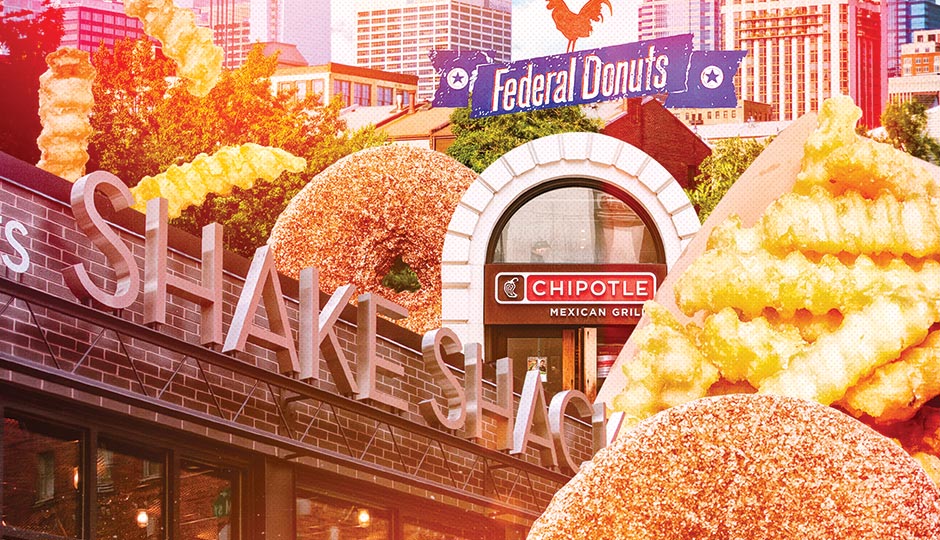Why Philly Chefs Keep Opening Fast-Casual Restaurants

Illustration by Gluekit
“If I had a nickel for every time I heard the expression ‘I’m going to be the Chipotle of blank,’ I’d be rich,” says Steve Cook, the local restaurateur who, along with James Beard winning chef Michael Solomonov, owns the fine-dining eateries Zahav and Abe Fisher. Of course, given that Cook and Solomonov also own fast-casual hummusiya Dizengoff and the fast-growing Federal Donuts empire — five locations and counting — it’s probably something he’s said to himself.
Who can blame him? As Philadelphia diners have stepped up their demand for good food at every price point, a whole new market for quality eateries has opened up — one that just happens to include more takeout counters than OpenTable reservations.
“Everyone wants to be the next Danny Meyer,” says Stephen Starr, speaking of the venerable New York restaurateur who built his reputation on fancy restaurants like Gramercy Tavern but built his fortune on a burger joint named Shake Shack. Started as a hot-dog cart in Madison Square Park in 2001, that chain — which now has 70 global locations and a value of $560 million — is more than just a one-off success story. Along with Chipotle, it has upended the way we perceive fast-food chains, which had devolved from places where moms happily had play dates in the ’80s to places where we’d eat only because of a four-hour delay in Terminal E. With organic meat that’s never frozen, chef collaborations, a Michelin-star approach to customer service and reclaimed wood tables, Shake Shack was built for the Instagram generation, which will gladly pay a few extra bucks for a quality burger. (Sorry, Dollar Menu.)
And Shake Shack’s success has caught the attention of chefs — in Philadelphia and beyond — who just a decade ago wouldn’t have dared to associate their names with anything mass-produced. (Remember when Wolfgang Puck launched a line of frozen pizza? Sell. Out.) Marc Vetri, who recently opened a second location of Pizzeria Vetri in Rittenhouse, has announced plans to expand to D.C. and Austin, Texas. Mitch Prensky of Supper just launched Scratch Biscuits, a concept he’s described as scalable. And the Garces Group — which closed down its highest-end eatery, in the Kimmel Center, for a summer break — recently opened up Buena Onda, with sustainable fish tacos and frozen margaritas and first-come, first-served seating.
“For a chef who takes himself seriously, there’s no shame in doing something like this anymore,” says Cook. In fact, that he’d spend time, energy and resources on opening another Zahav-like restaurant seems increasingly unlikely: “We’ve said that — that we’ll never open another high-end place again.”
Here’s why quick-serve just makes sense: What with minimum-wage hikes, paid sick leave, and the fact that high-end restaurants demand high-paid talent, labor costs — already a major chunk of any restaurant’s operating budget — will only continue to soar. Then there are the menus that change nightly and wine lists to manage and a front-of-the-house staff that has to be on point, always, all of which is exhausting.
The potential for big returns means investors are lining up to get behind a chef with a brilliant idea, a proven track record and a fast-growth concept. (None of the owners I talked to are interested in franchising; they know from their fine-dining experience that control is key.) The talent is into it, too. “A lot of cooks don’t want to get out of work at 1 a.m. and have their free time in the morning anymore,” says Cook. “Some of them want normal schedules.”
Beyond our vanguard chefs, there’s another reason Philly is proving to be an effective incubator for the next great chain: We’re getting pickier. As diners, we increasingly prefer authenticity and homegrown concepts, which, um, have to taste good. “When I hear an operator in New York or D.C. say they’ll roll into Philly and perform really well, I feel a little bad for them,” says Cook. “Because Philly is tough.” (Shake Shack just might be the first chain to land here that’s an actual destination for locals.) But if something is successful locally, where there’s a fickle consumer base and a lot of competition, there’s a good chance the less persnickety public (a.k.a. America) will embrace it, too. So, what’s the saying? If you can make chicken here, you can make it anywhere.
Originally published as “Table for Two Million” in the September 2015 issue of Philadelphia magazine.


